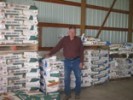
If you haven't been to a field day and already placed an order for seed, likely you've at least had a salesman call on you. Maybe by phone, more likely by dropping by, or perhaps he's caught you in the field. If he's a current supplier, maybe you let him ride the combine with you, and picked his brain.
If you're ready to think about 2011 and have the chance to pick the brain of a seed salesman, whether it's one you buy from or not, what kind of questions should you ask? What will it take to get you to sign on the dotted line and commit to a seed purchase, either with your existing seed supplier(s) or a new company?
Here are 5 questions you might want to consider. Look for 5 more tomorrow, and five the next day. Dave Nanda, a crops consultant, new director of genetics and technology for Seed Consultants, Washington Courthouse, Ohio, and one of those seed guys who have already ridden in combines these falls, contributed to forming this set of questions. Be honest with yourself in answering each one.
One. What hybrids are you recommending for next year? Any salesman should have some hybrids in mind that might fit your soils before he arrives. He should know those hybrids inside and out.
Two. Why should I switch from what I'm growing now? Especially if you've got your own seed plot, a good rule of thumb is to plant many acres in 2011 that did well for you in the past. Since the past two years have been so different, it would help if you've seen the hybrids for two years.
Three. Are these hybrids unique, or do other companies sell them? The cat is out of the bag, and has been for a long time. Many companies sell hybrids that are the same genetics. Don't let a salesman snow you into thinking otherwise. A few larger companies offer their own genetics. Just because two companies sell the same genetics doesn't mean it isn't good genetics, but you want to make sure you're not ending up with three hybrids and one set of genetics.
Four. Why should I buy a hybrid I've never seen? A wise, old ag teacher, Jim Cummings, Seymour, once said "You don't want to be the last person to try something, but you don't always want to be the first, either." If it's a brand new hybrid, likely new technology, ask for documentation of how it's performed in various tests in various areas. Perhaps try a few bags the first year.
Five. What are the strengths and weaknesses of each hybrid? A sharp salesman will know and will be open and admit if the hybrid is susceptible to disease, tends to cannibalize and fall over, or has some other shortcoming. If a salesman for Brand X is pumping Hybrid Y and says it has no shortcomings, head for the hills! Either he doesn't really know the hybrid, or he's good at talking. There are many great hybrids on the market. At the same time, the perfect hybrid is still out there for some breeder to find.
Come back tomorrow for five more seed-selection tips.
About the Author(s)
You May Also Like




